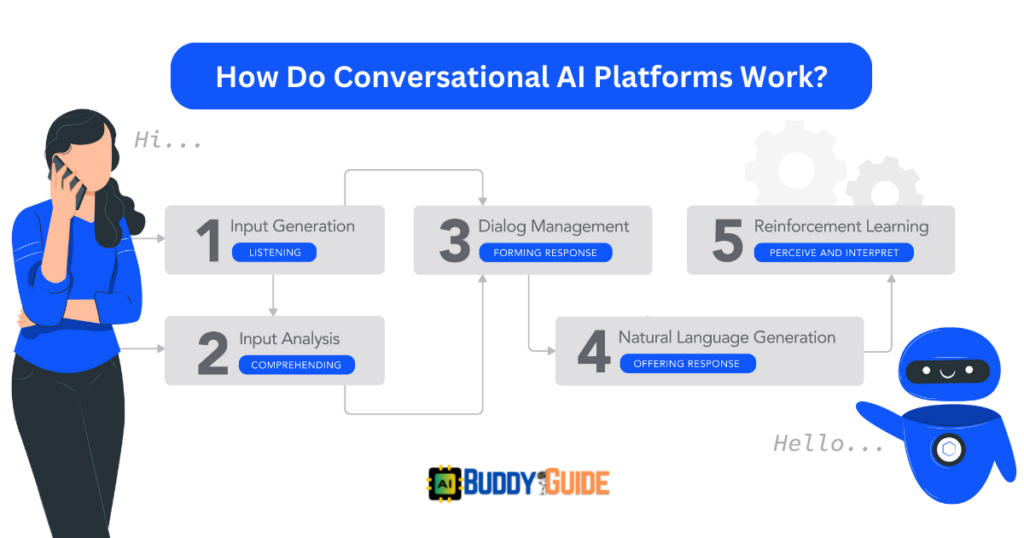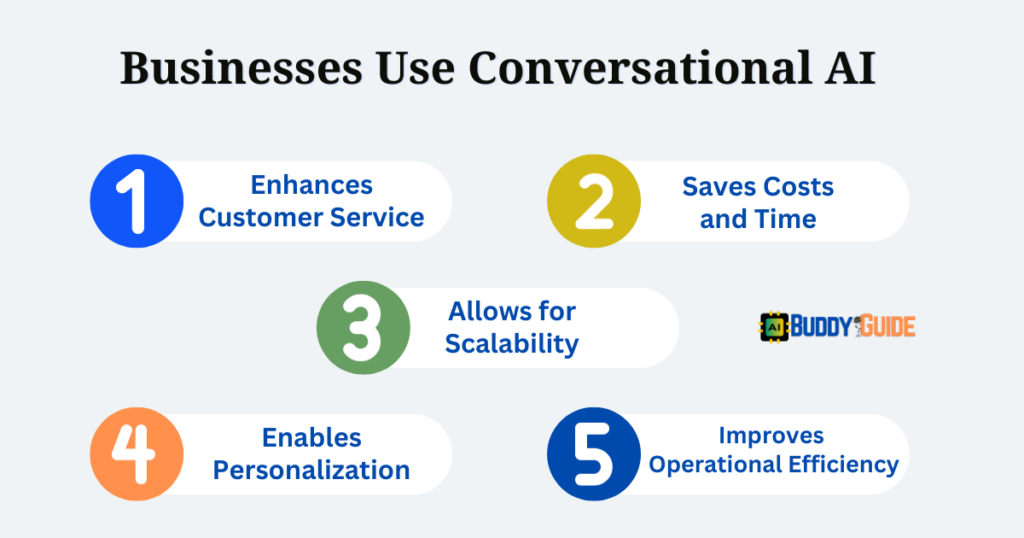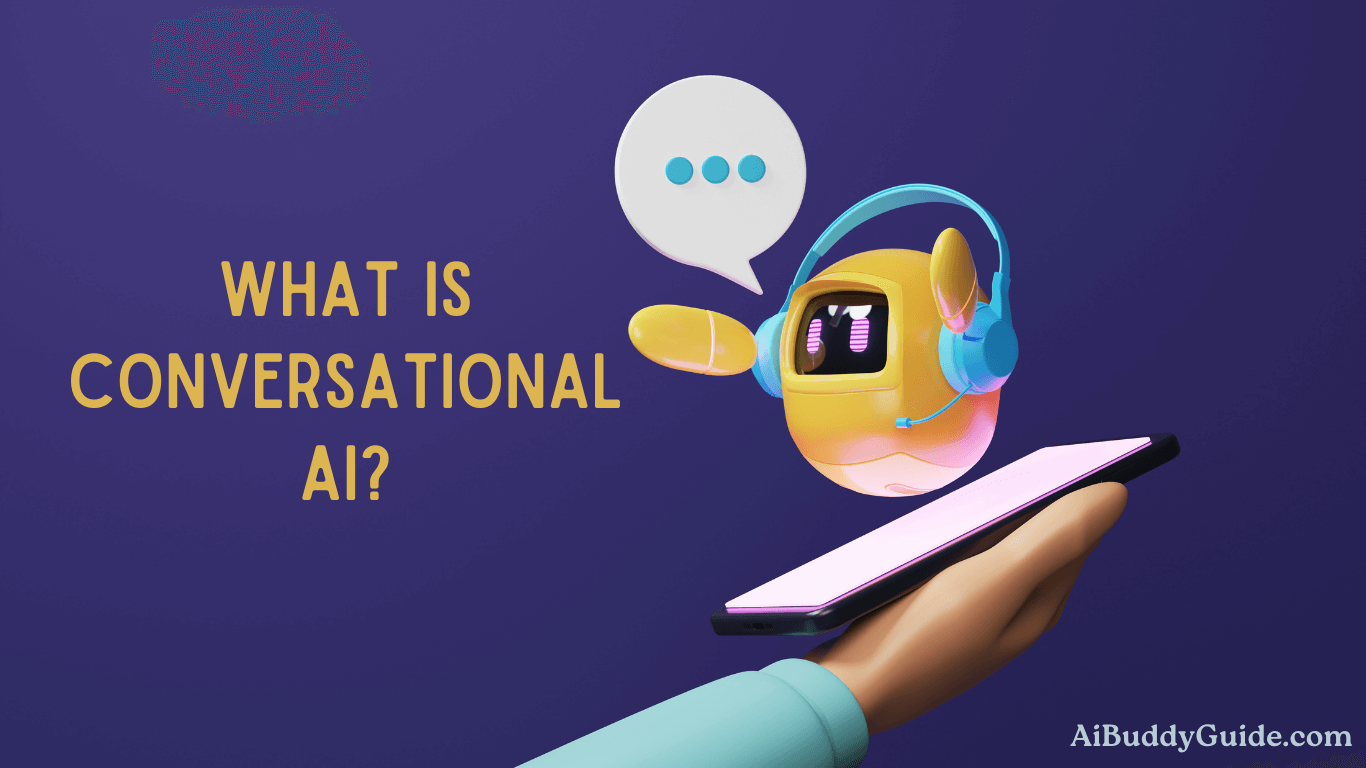The importance of communication in today’s fast-paced world cannot be overstated.
We rely heavily on effective communication to convey our thoughts and needs, whether we are interacting with friends, family, or businesses.
The advancement of technology has led to the development of a new form of communication known as Conversational AI. Using this innovative technology, we are changing the way we interact with machines and shaping the future of communication.
What Exactly is Conversational AI?
Conversational AI, also known as chatbots or virtual assistants, is a branch of artificial intelligence that enables machines to understand and respond to human conversations.
It combines natural language processing (NLP) and machine learning algorithms to simulate human-like conversations. Conversational AI platforms are able to understand user queries, provide relevant responses and even perform actions based on these conversations.
These platforms can be integrated into various devices and applications, such as messaging apps, websites and smart speakers, making them easily accessible to users.
How Do Conversational AI Platforms Work?

Conversational AI platforms work by using sophisticated algorithms and machine learning techniques to process human language.
When a user interacts with a conversational AI system, the platform analyzes the input to understand the user’s intent and context.
It then generates an appropriate response using pre-programmed responses or by accessing a vast database of information.
Over time, these platforms learn from user interactions and improve their responses through machine learning, making them more accurate and efficient in understanding and addressing user queries.
Why Should Businesses Use Conversational AI?
Conversational AI offers numerous benefits for businesses across different industries. Let’s explore some of the key reasons why businesses should embrace this technology:

1. Enhances Customer Service
One of the primary advantages of using Conversational AI is its ability to enhance customer service. By implementing chatbots or virtual assistants, businesses can provide instant support to their customers, 24/7. These AI-powered systems can handle a wide range of customer queries, such as product inquiries, order status updates, and troubleshooting assistance. With quick and accurate responses, businesses can improve customer satisfaction and loyalty, leading to increased sales and positive brand reputation.
2. Saves Costs and Time
By automating customer support through Conversational AI, businesses can save significant costs and time. Instead of hiring a large team of customer service representatives, a chatbot can handle multiple customer interactions simultaneously, reducing the need for human resources. Additionally, chatbots can provide instant responses, eliminating the need for customers to wait in long queues or endure lengthy response times. This efficiency not only saves time for both businesses and customers but also reduces operational costs.
3. Allows for Scalability
Conversational AI platforms offer businesses the flexibility to scale their operations without compromising on customer service quality. As businesses grow, the demand for customer support increases. With Conversational AI, businesses can easily handle a high volume of customer queries without the need for additional human resources. Chatbots can seamlessly handle a large number of interactions, ensuring consistent and efficient customer support, even during peak periods.
4. Enables Personalization
Personalization is a key factor in enhancing the customer experience. Conversational AI platforms can analyze user data and preferences to provide personalized recommendations and solutions. By understanding user behavior and preferences, chatbots can offer tailored suggestions, product recommendations, and even personalized discounts. This level of personalization not only improves customer satisfaction but also increases the likelihood of repeat purchases, leading to higher customer retention rates.
5. Improves Operational Efficiency
Conversational AI platforms can streamline various business processes, leading to improved operational efficiency. For example, in the healthcare industry, chatbots can assist with appointment scheduling, patient triage, and symptom analysis. In the banking sector, chatbots can help customers with account inquiries, transaction history, and money transfers. By automating these tasks, businesses can reduce manual effort, minimize errors, and allocate resources to more value-added activities, ultimately improving overall operational efficiency.
Conversational AI Examples and Applications
Conversational AI is being utilized across various industries and applications. Let’s explore some real-world examples of how this technology is shaping the future of communication:
- E-commerce: Many online retailers are implementing chatbots to provide instant customer support and personalized product recommendations. These chatbots can guide customers through the purchase process, answer product-related queries, and even assist with returns or exchanges.
- Travel and Hospitality: Chatbots are revolutionizing the travel and hospitality industry by providing quick and accurate responses to customer inquiries. They can assist with flight bookings, hotel reservations, and even suggest popular attractions and restaurants at the travel destination.
- Healthcare: Conversational AI platforms are being used in the healthcare industry to improve patient care and support. Chatbots can help patients schedule appointments, provide medication reminders, and even offer virtual consultations for non-emergency medical conditions.
- Banking and Finance: Many banks have integrated chatbots into their online platforms to handle customer inquiries and provide banking services. Chatbots can assist with balance inquiries, fund transfers, bill payments, and even offer financial advice based on the user’s financial goals and preferences.
- Education: Educational institutions are leveraging Conversational AI to enhance the learning experience for students. Chatbots can provide instant answers to academic questions, offer personalized study plans, and even assist with language learning by providing interactive conversations.
FAQs on What is Conversational AI
Q1. What is the difference between Conversational AI and traditional chatbots?
Q2. Can Conversational AI understand multiple languages?
Q3. Are Conversational AI platforms secure?
Conclusion
Conversational AI is revolutionizing the way we communicate with machines and shaping the future of communication.
By using natural language processing algorithms and machine learning, companies can improve customer service, save costs and time, increase scalability, enable personalization and improve operational efficiency.
This technology has already found applications in various industries, including e-commerce, travel, healthcare, banking and education. As Conversational AI continues to evolve, we can expect even more innovative and seamless interactions between humans and machines, making communication more efficient and personalized than ever before.
The use of Conversational AI is not just a trend, but a necessity for companies that want to stay ahead in the digital age. So are you ready to join the conversational revolution?

